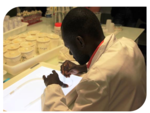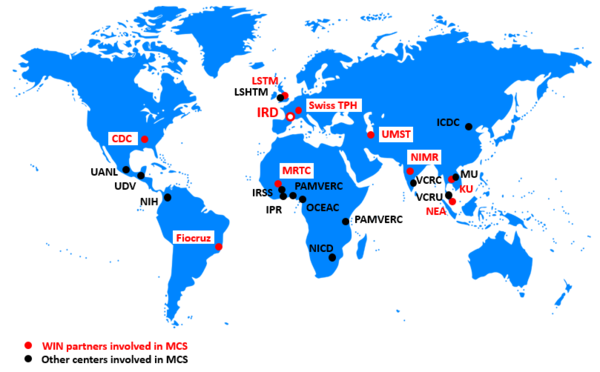Inter-lab validation for determination of discriminatory concentrations of insecticides for resistance monitoring in mosquitoes
In the frame of the WHO Global Vector Control Response: 2017-2030 (GVCR), the Worldwide Insecticide resistance Network has been commissioned by WHO to coordinate a multi-centre study (MCS) for validation of test protocols and determination of discriminating concentrations for adult mosquitoes for key selected insecticides used either in malaria and Aedes vector control.
Background
Information on vector resistance status serves as a basic requirement to:
- Guide on insecticide selection for malaria and dengue vector control;
- Ascertain the susceptibility to insecticides already in use;
- Address the efficacy of Insecticide Resistance Management (IRM).
In practice, insecticide resistance is monitored in field populations through a series of bioassays measuring mosquito mortality to a known standard dose of a given insecticide (known as the diagnostic or discriminating concentration ) [1]. The concept of discriminating concentrations (DCs) has clear advantages in terms of the cost and efficiency of testing and has been widely adopted for the purposes of monitoring insecticide resistance in mosquitoes and other disease vectors [1]. DCs for a range of pyrethroid insecticides were established for the first time in the 1998 [2] through a multi-centre study involving 9 institutes and 12 Anopheles species ( WHOPES website).
Unfortunately, few DCs are currently available for Aedes mosquitoes [3] which impedes the implementation of appropriate monitoring and management of insecticide resistance in arbovirus vectors [4]. References .
In addition, no DCs have been validated for most of the newer classes of public health insecticides including those having slow killing effects (e.g. Chlorfenapyr) and/or novel modes of action (eg pyriproxifen, etc). This information is key to establish the baseline susceptibility of vector populations to these new insecticides and to detect any change in phenotypic resistance after their deployment.
Objectives
Provide administrative and coordination support to WHO for implementation of the study
- Draft a generic proposal for multi-centre validation of DCs of insecticides for resistance monitoring in mosquitoes.
- Coordinate testing activities between participating centres.
- Analyze data and submit a final report to WHO for final recommendations on DCs.
- Monitor progress of the project (Phases I and II).
Participate in the study for development of discriminating concentrations
- Contribute to the development and validation of bottle bioassay methodology for determination of DCs for selected compounds that are unstable or infeasible on filter papers (Phase I).
- Contribute to the establishment of dose-response lines in WHO bottle bioassays and tube test using filter papers (Phase II).
- Participate in validation of selected DCs for resistance testing (Phase II).







